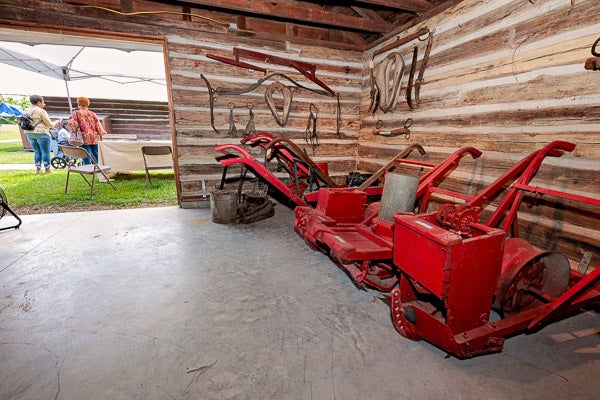CELEBRATING JUNETEENTH
Event leads to oral history project remembering Black farming families in eastern NC
A Juneteenth celebration at the Eastern Carolina Village and Farm Museum on Saturday helped lay the foundation for an oral history project with East Carolina University.
In commemoration of the emancipation of enslaved people in the United States, the museum hosted Willie Hawkins Day honoring the legacy of a successful Black farming family that operated Avon Farm near Grimesland in Pitt County.
Willie Hawkins, who died in 1993, donated two circa 1890 tobacco barns to the museum shortly after it opened at the Pitt County Fairgrounds in the late 1970s. In 2009, the museum was relocated to the former Pitt County home site on County Home Road in Greenville.
On Saturday, Willie Hawkins’ descendants were honored and shared remembrances of growing up on the farm. Plans are underway to preserve those stories through a grant-funded oral history and community archiving project in a partnership between the museum and ECU, said Jennifer Daugherty, head of the North Carolina Collection for ECU’s library. “I’m very excited to work with the museum and this group,” Daugherty said.
Dwight Hawkins, Willie’s oldest son, and Mamie Pritchard, Willie’s sister, told a group gathered at the museum about life on the 130-acre Avon Farm, where the family grew cotton, tobacco, peanuts, corn and other garden vegetables. “Tobacco put me through college,” Dwight said. “From May 1 to Sept. 1, we worked 14- to 18-hour days.”
They looped or tied tobacco to 500-600 sticks and then hung it in their barns, preparing it for market. At one time, Greenville was reputedly the largest tobacco market in the world.
Dwight, who lives in Wendell and is one of Willie’s seven children, said one of his responsibilities was feeding all the farm animals that included dogs, cats, chickens, pigs, cows and mules. “I was the last one to plow with a mule,” he said. “To this day, I don’t care too much for animals.”
The family didn’t have a phone until Dwight was about 16, the age when he was allowed to date. He wasn’t allowed to associate with boys older than him. “He was real strict on us,” Dwight said of his father. “He had a heavy hand on us. He said, ‘Look, when you get 18, you can make your own decisions.”

The buildings that Willie Hawkins donated house many of the village’s small farm artifacts including cotton, bean and corn planters, fertilizer spreaders and numerous plows and hand tools.
Education was important to their father. Dwight graduated from N.C. State University and his siblings went to Barber Scotia College, N.C. A&T, Elizabeth City State, the University of North Carolina at Chapel Hill, and ECU, where his brother played football. “You were always taken care of,” Dwight said. “He made sure his children got what they needed. There was a lot of love in that house.”
Dwight helped integrate Pitt County Schools and was a member of the first graduating class at D.H. Conley High School. N.C. State basketball coach Norm Sloan, wearing one of his signature plaid jackets, came to Conley to watch Dwight play. Dwight signed a letter of intent, and although he ended up not playing, basketball star David Thompson was his mentor. After earning his business degree, Dwight later returned to N.C. State’s College of Education, where he worked for 25 years and started its STEM outreach program.
Pritchard said the family’s success could be attributed the work ethic of her grandfather Otis Hawkins. “The family was successful because if you want something, you go get it,” she said. “That’s what I did, and I think that’s what my grandfather did. He took what he had when he came here and he used it wisely.”
Share your story
Are you a Black farmer that owned a farm, worked in farming or came from a family that farmed in eastern North Carolina? ECU would like to help you record your story and share it. Contact Jennifer Daugherty in the ECU library’s special collections division at daughertyj18@ecu.edu or call 252-328-0290
Sharon Arnold, programming and events coordinator for the museum, said the Hawkins family philanthropy extends throughout Pitt County. Otis Hawkins gave land to the county for what would eventually become G.R. Whitfield School. He gave pews to the local church and supported the surrounding area. “They are an exemplary farming family in Pitt County,” said Arnold, a retired Greene County educator. “These are some of the stories we want to archive and have at ECU so future scholars and students will have a clearer picture of eastern North Carolina.”
Daugherty is interested in talking to Black farmers who own or owned a farm, worked in farming or came from a family that farmed in eastern North Carolina for the oral history project. The library received a $10,000 grant from an American Library Association American Rescue Plan: Humanities Grants for Libraries to help pay for equipment to record the stories. To participate in the project, email daughertyj18@ecu.edu or call 252-328-0290.
Holly Mathews, ECU emeritus professor of anthropology, is president of the museum’s board, and ECU historian and history professor John Tucker is a past board member. For more information, visit the museum’s Facebook site.
Related
ECU ALS receives ALA Grant!
